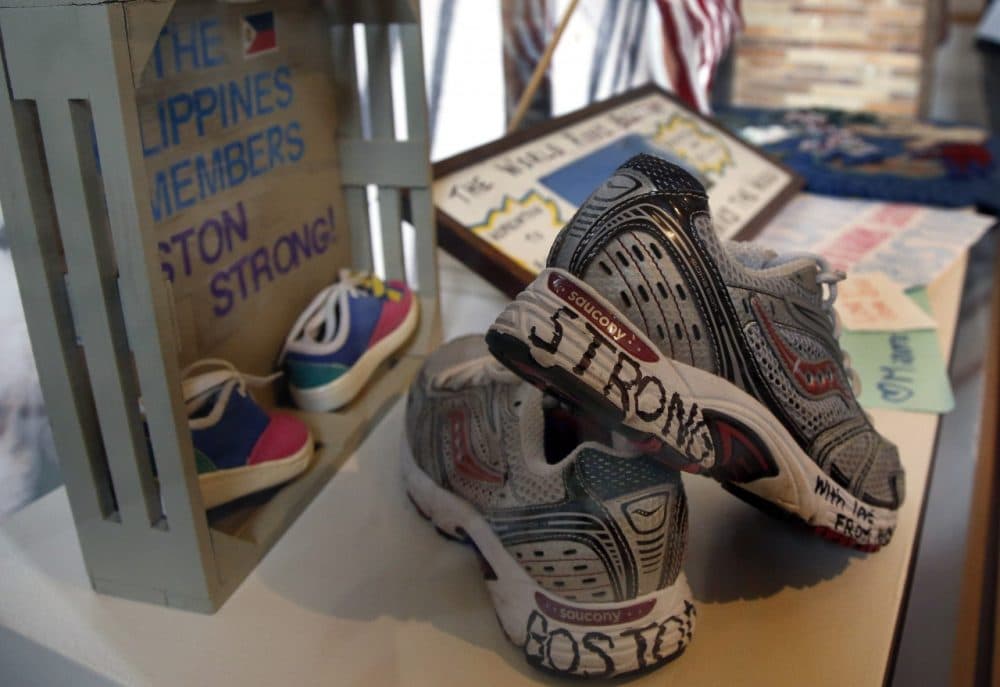Advertisement
A Different Perspective On 'One Boston'
Resume
Slogans like "Boston Strong" and "One Boston" helped rally Bostonians together after last year's Marathon bombing. But Jamarhl Crawford, a Roxbury-based community activist, suggests that the idea of "One Boston" doesn't resonate quite the same way across all parts of the city — particularly in those communities regularly plagued by violence.
Crawford wants brings a number to the attention of people across the city, and across the world: 235. That's the number of shootings in Boston since last year's Marathon.
Guest
Jamarhl Crawford, creator and editor of Blackstonian, a news and commentary publication and website representing Boston's black community. He tweets at @jamarhlakauno.
Highlights
On why Jamarhl chose to display the number 235 on his website:
Jamaarhl Crawford: "Obviously when we witnessed the Marathon thing, I'm a newsy so generally while I'm working throughout the day I have on CNN, and I, like most people across the country, were shocked when this news broke. Particularly at the Marathon, which I've attended several times in the past. But then it became, to me, kind of clear that the way that the coverage of this tragedy was taking place seemed to be different. Somehow, things that happened to white people, or things that happened in 'white places' — where violence is not supposed to occur — that it's seen as this affront to everything that is sacred and holy. Whereas in communities like the one that I live in — Roxbury, Dorchester, Mattapan — not so much. It's seen as what I've now begun calling the 'regular violence.' It's supposed to happen, and it happens in those places and it happens to those people. So that's where the rhetoric behind this 'One Boston,' 'Boston Strong,' kind of falls very flat because, for a long time, my people in my community have been suffering with a problem that we don't get the same amount of attention and, not just attention, but sympathy and empathy."
On the idea that the Marathon bombing was an attack on the whole city's tradition:
JC: "I don't know if I buy into that. I think that when 235 people are shot in the city of Boston, isn't that an attack on the city? Aren't those lives worth something? Some of those people are shot and killed, some of them are just shot and wounded. But it's not just them. The community is traumatized. Certainly their immediate family and friends are traumatized. I, myself, got shot 10 years ago, April 28 will make 10 years when I got shot and I'm still not over it. So, I mean, there's a level of trauma and healing that hasn't happened and the attention is not so much on media coverage because the media does cover it because it's sensational. But what we'd like to see is a systemic type of approach to bringing solutions in a substantive form to these issues and there's people who have ideas on how to stem the violence but they're not heard and they're marginalized much like the people who are marginalized who are the victims of violence."
On what people should keep in mind for the Marathon bombing anniversary:
JC: "To point out the hypocrisy and the contradiction in what we call the devaluation of black and brown life. Where black and brown life is just not held as equal to our white counterparts. What we're calling for is attention to our issues in our community. And the path that we're on right now, which is this rush to incarcerate, it does not work. We've got to hit the streets, we're trying to re-prioritize the funding at the state level to get away from that law and order mentality and go more into the programs that we know work. And that is what we believe, ultimately, will stem the tide of violence and hopefully, soon in this city and in this country, black and brown people's lives can be seen as just as important and loss of that life — just as unacceptable as the loss of white life and tragedies that take place."
More
WBUR: Furry, 4-Legged Therapist Helps Marathon Bombing Victims Through Hard Year
- "To understand why Rescue came into their lives, you have to know how badly Kensky in particular was hurt."
Cognoscenti: The Question Of Time In The Aftermath Of Tragedy
- "The adage is true enough. But time, which most eases suffering, is the thing we can’t buy or beg for. We simply have to wait."
CommonHealth: Boston Hospitals Reflect With Pride On Marathon Bombing Response
- "Early in the afternoon last April 15, Dave Reisman was laughing as he left a meeting to update hospitals around the city about conditions at the Boston Marathon. It looked like a light year for patients. The weather was sunny, but not too hot."
This segment aired on April 14, 2014.